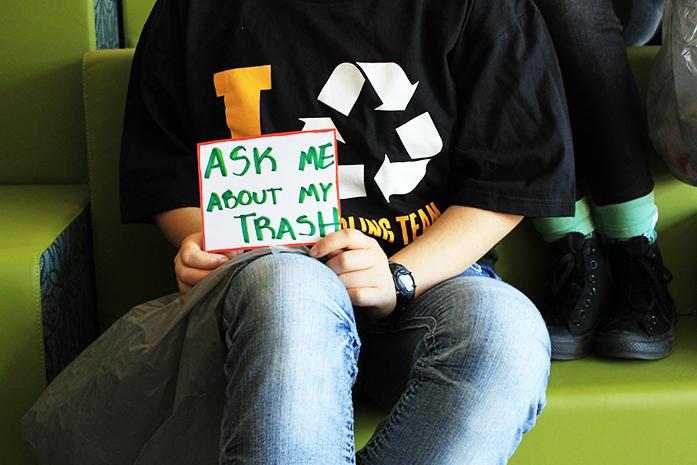University of Iowa students are taking responsibility for what they are putting in the landfill by collecting their trash and carrying it with them throughout the week.
According to the Environmental Protection Agency, Americans produce, on average, 4.40 pounds of non-recyclable waste per person per day.
The demonstration will conclude RecycleMania — an eight-week effort to increase waste-diversion rates on campus. During this time, the UI diverted nearly 50 percent of its waste from landfills in the form of recycling and composting.
“You are physically carrying your trash from Monday to Friday, and in that time you’re encouraged to recycle and compost because you want to have nothing in your bag,” participant Maya Nevels said. “And it’s not just about recycling, it’s about reducing consumption in general.”
The participants have recruited people from various student groups, including the UI Student Government and the UI Environmental Coalition, to take part in the demonstration and raise awareness through grass-roots efforts.
“This week will be successful if we have a lot of conversations with people,” participant Elana Becker said. “We want to break down this idea that it takes a lot of effort to be environmentally conscious, but once you make it a priority, it’s not a great addition on your routine and it leads to greater mindfulness.”
The group also wants to make people more aware of composting on campus. UI Office of Sustainability intern Tara Slade said anyone can bring compostable things to the IMU for disposal.
RELATED: Hopefuls agree on environment
“If you have a biodegradable thing like a banana peel, you can put it in the grass, that’s better than putting it in the landfill if you can’t compost,” Slade said. “The way that it interacts with other materials in the landfill creates methane, which is a harmful gas.”
Slade said she has learned a lot from the experience of carrying her own trash so far.
“No matter how aware you think you are, you become more mindful when you’re forced to carry it,” Slade said. “At the end of the day you look at what you’re wasting and realize you don’t have to waste all of that, and you can change your habits.”
Nevels said she realized most of her personal waste is in the form of paper and cotton — not all of which can be recycled or composted.
“Some of it is getting recycled, but the energy that goes into making that to new paper is huge,” Nevels said. “Also you can’t recycle paper towels, or makeup remover wipes and cotton pads. I found the biggest things are little things that are part of your daily routine.”
Nevels said she hopes this demonstration can encourage people to prioritize waste diversion in their daily lives.



